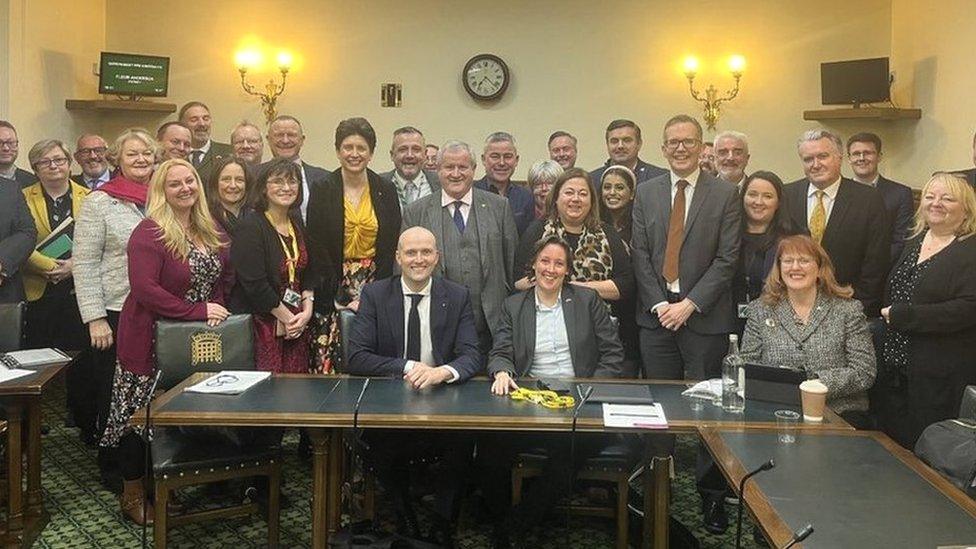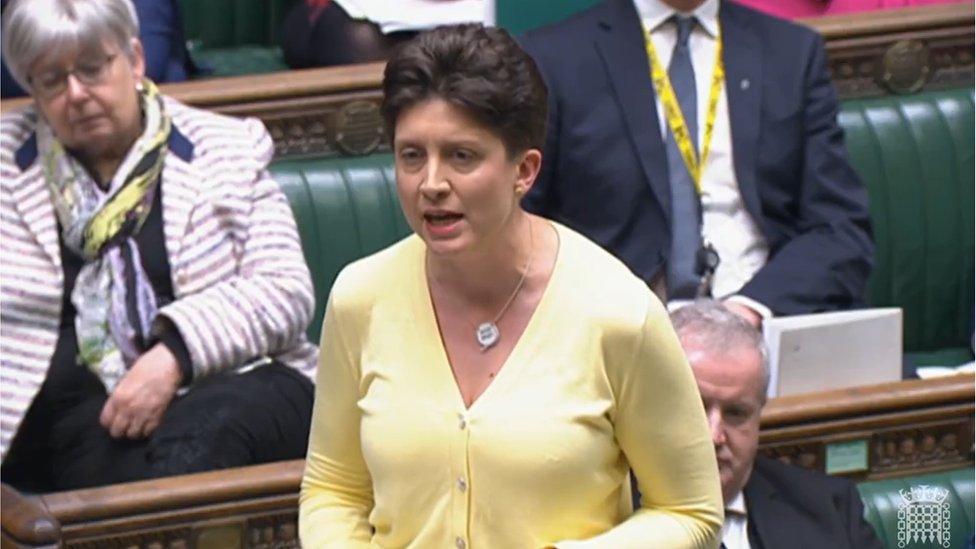SNP split claims are complete fiction, MP insists
- Published

Mr Flynn (sitting alongside new deputy leader Mhairi Black) was elected as the SNP's Westminster leader at the group's AGM on Tuesday evening
Reports of deep divisions within the SNP are a "complete fiction", a senior MP has insisted.
Stewart Hosie was responding to claims that Stephen Flynn's victory over Alison Thewliss in the party's Westminster leadership contest showed the party was now split.
Mr Hosie said "not one word of that is true" and he had "no idea where these stories have come from".
Ms Thewliss is seen as being a close ally of Nicola Sturgeon.
But she lost by 26 votes to 17 to Mr Flynn in a ballot of the party's 44 MPs on Tuesday evening, with one member not taking part.
Mr Flynn questioned Rishi Sunak at Prime Minister's Questions for the first time as group leader on Wednesday, where he highlighted a new opinion poll, external which suggests support for independence is at 56% - higher than other recent polls which have tended to show a narrow majority in favour of remaining in the UK.
He asked Mr Sunak whether "increasing energy bills" in Scotland will "cause those poll numbers to rise or to fall", with the PM responding by pointing to the £55bn in energy bill support his government is providing this winter.
The SNP's political opponents have claimed that the defeat of the candidate widely assumed to have been the first minister's preferred choice was a "personal humiliation" for Ms Sturgeon and "lays bare the deep splits within the SNP".
But Mr Hosie told the BBC Radio's Good Morning Scotland programme that the SNP was "absolutely united" by their goal of achieving independence and by the "fantastic leadership of Nicola Sturgeon".
Mr Hosie, a former deputy leader of both the party and its Westminster group, added: "With Stephen Flynn at the helm in Westminster I think we'll see closer working than we've ever done."
Mr Flynn was elected as leader after the resignation of Ian Blackford, who was also close to Ms Sturgeon.
There had been reports for several months that many SNP MPs were increasingly unhappy with Mr Blackford's leadership, particularly after he urged them to give their full support to former chief whip Patrick Grady.
Mr Grady was suspended from the party and the Commons earlier this year for sexual misconduct.
Mr Flynn denied just two weeks ago that he was plotting to oust Mr Blackford alongside colleagues from the so-called Tuesday Club - a group of male SNP MPs who are said to hold regular five-a-side football, beer and curry nights.
Stephen Flynn says he will push the impact of the cost of living and Scotland's right to choose its future
When Mr Blackford subsequently confirmed he was standing down, Mr Flynn was initially expected to be the only candidate to replace him before Ms Thewliss unexpectedly announced that she was also standing in the contest.
Mr Hosie, who backed Mr Flynn in the vote, said the new leader would bring a "different tone" to Mr Blackford, and would be "snappier and more vibrant".
He added: "I think he will bring a great deal to the table and a great deal to the independence cause as we hold this government to account.
"I think Stephen has a rare gift of being able to communicate difficult things in a really effective way and I am looking forward to seeing it deployed particularly when we get to Prime Minister's Questions".
He also dismissed suggestions that the party's MPs were now split between "Sturgeon loyalists and Sturgeon sceptics" - with Mr Flynn a sceptic - as untrue.
Mr Hosie said: "I have to say I did see some of these stories over the past few days and on a couple of occasions I nearly spat out my coffee with laughter.
"Not one word of these divisions is true. I have no idea where these stories have come from."
Ms Sturgeon tweeted, external shortly after the vote that Mr Flynn and his new deputy Mhairi Black would make a "truly formidable team" and that she was looking forward to working with them both.
But Scottish Conservative chairman Craig Hoy said the result of the leadership contest showed that "the first minister's once-iron grip on her party is slipping" and that it "lays bare the deep splits within the SNP".
And Ian Murray, Labour's shadow Scottish secretary, claimed Ms Sturgeon had been given a "two finger salute" by SNP MPs who chose to back Mr Flynn over Ms Thewliss.

Alison Thewliss is seen as being closer to SNP leader Nicola Sturgeon than Mr Flynn is
The new Westminster leader has been installed just a fortnight after the Supreme Court ruled that the Scottish government cannot hold a second independence referendum without the UK government's consent.
Ms Sturgeon had wanted to hold a vote next October but now says she will use the next general election as a "de facto referendum" - a move that is said to have unsettled some of the party's MPs.
When asked if all 44 SNP MPs would get behind that plan, Mr Hosie replied: "Yes. This is the plan which we have. It is likely to be the next election.
"It is the one where we can put forward in a manifesto that a vote for the SNP means we're moving towards independence.
"That is the clearest and most legal and constitutional way of doing it".
He also played down reports of a difference of opinion between Mr Flynn and Ms Sturgeon over the future of the North Sea.
Ms Sturgeon opposes drilling for new oil and gas fields, while Mr Flynn - whose Aberdeen South constituency is at the heart of the industry - is said to have a different view.
Mr Hosie insisted that there was "no policy division whatsoever" over the issue, adding: "He is very much in favour of making sure that transition funding is put in place, so that all of those highly skilled, highly talented people in the north east of Scotland can be deployed in a renewable future".


Stephen Flynn was chosen by the SNP's MPs to lead them in the Commons in part because they hoped he would be a punchy presence at big events like Prime Minister's Questions.
He may have been given a warmer welcome than the man he is replacing was used to - Ian Blackford was generally greeted with a chorus of jeers from the government benches.
The new Westminster leader of the SNP Stephen Flynn takes part in his first Prime Minister's Questions
But the 34-year-old is clearly planning on taking an adversarial approach to the Conservatives and Labour, aiming barbs at both parties.
The bigger job for Flynn may be bringing his party's fractious group together in the wake of a leadership contest which was not the coronation he had hoped for.
With the SNP planning to use the next general election as a single-issue campaign on the issue of independence, those MPs could find themselves on the very frontline of the debate over Scotland's future.